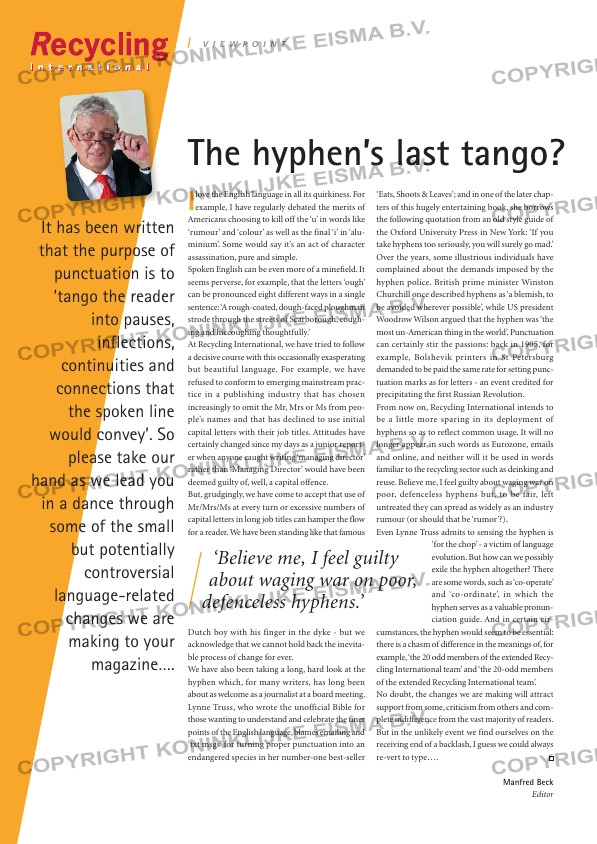Page 2 from: March 2013

V I E W P O I N T
Manfred Beck
Editor
I love the English language in all its quirkiness. For example, I have regularly debated the merits of
Americans choosing to kill off the ‘u’ in words like
‘rumour’ and ‘colour’ as well as the final ‘i’ in ‘alu-
minium’. Some would say it’s an act of character
assassination, pure and simple.
Spoken English can be even more of a minefield. It
seems perverse, for example, that the letters ‘ough’
can be pronounced eight different ways in a single
sentence: ‘A rough-coated, dough-faced ploughman
strode through the streets of Scarborough, cough-
ing and hiccoughing thoughtfully.’
At Recycling International, we have tried to follow
a decisive course with this occasionally exasperating
but beautiful language. For example, we have
refused to conform to emerging mainstream prac-
tice in a publishing industry that has chosen
increasingly to omit the Mr, Mrs or Ms from peo-
ple’s names and that has declined to use initial
capital letters with their job titles. Attitudes have
certainly changed since my days as a junior report-
er when anyone caught writing ‘managing director’
rather than ‘Managing Director’ would have been
deemed guilty of, well, a capital offence.
But, grudgingly, we have come to accept that use of
Mr/Mrs/Ms at every turn or excessive numbers of
capital letters in long job titles can hamper the flow
for a reader. We have been standing like that famous
Dutch boy with his finger in the dyke – but we
acknowledge that we cannot hold back the inevita-
ble process of change for ever.
We have also been taking a long, hard look at the
hyphen which, for many writers, has long been
about as welcome as a journalist at a board meeting.
Lynne Truss, who wrote the unofficial Bible for
those wanting to understand and celebrate the finer
points of the English language, blames emailing and
‘txt msgs’ for turning proper punctuation into an
endangered species in her number-one best-seller
‘Eats, Shoots & Leaves’; and in one of the later chap-
ters of this hugely entertaining book, she borrows
the following quotation from an old style guide of
the Oxford University Press in New York: ‘If you
take hyphens too seriously, you will surely go mad.’
Over the years, some illustrious individuals have
complained about the demands imposed by the
hyphen police. British prime minister Winston
Churchill once described hyphens as ‘a blemish, to
be avoided wherever possible’, while US president
Woodrow Wilson argued that the hyphen was ‘the
most un-American thing in the world’. Punctuation
can certainly stir the passions: back in 1905, for
example, Bolshevik printers in St Petersburg
demanded to be paid the same rate for setting punc-
tuation marks as for letters – an event credited for
precipitating the first Russian Revolution.
From now on, Recycling International intends to
be a little more sparing in its deployment of
hyphens so as to reflect common usage. It will no
longer appear in such words as Eurozone, emails
and online, and neither will it be used in words
familiar to the recycling sector such as deinking and
reuse. Believe me, I feel guilty about waging war on
poor, defenceless hyphens but, to be fair, left
untreated they can spread as widely as an industry
rumour (or should that be ‘rumor’?).
Even Lynne Truss admits to sensing the hyphen is
‘for the chop’ – a victim of language
evolution. But how can we possibly
exile the hyphen altogether? There
are some words, such as ‘co-operate’
and ‘co-ordinate’, in which the
hyphen serves as a valuable pronun-
ciation guide. And in certain cir-
cumstances, the hyphen would seem to be essential:
there is a chasm of difference in the meanings of, for
example, ‘the 20 odd members of the extended Recy-
cling International team’ and ‘the 20-odd members
of the extended Recycling International team’.
No doubt, the changes we are making will attract
support from some, criticism from others and com-
plete indifference from the vast majority of readers.
But in the unlikely event we find ourselves on the
receiving end of a backlash, I guess we could always
re-vert to type….
It has been written
that the purpose of
punctuation is to
‘tango the reader
into pauses,
inflections,
continuities and
connections that
the spoken line
would convey’. So
please take our
hand as we lead you
in a dance through
some of the small
but potentially
controversial
language-related
changes we are
making to your
magazine….
The hyphen’s last tango?
‘Believe me, I feel guilty
about waging war on poor,
defenceless hyphens.’
RI_2-Viewpoint.indd 3 06-03-13 09:00



